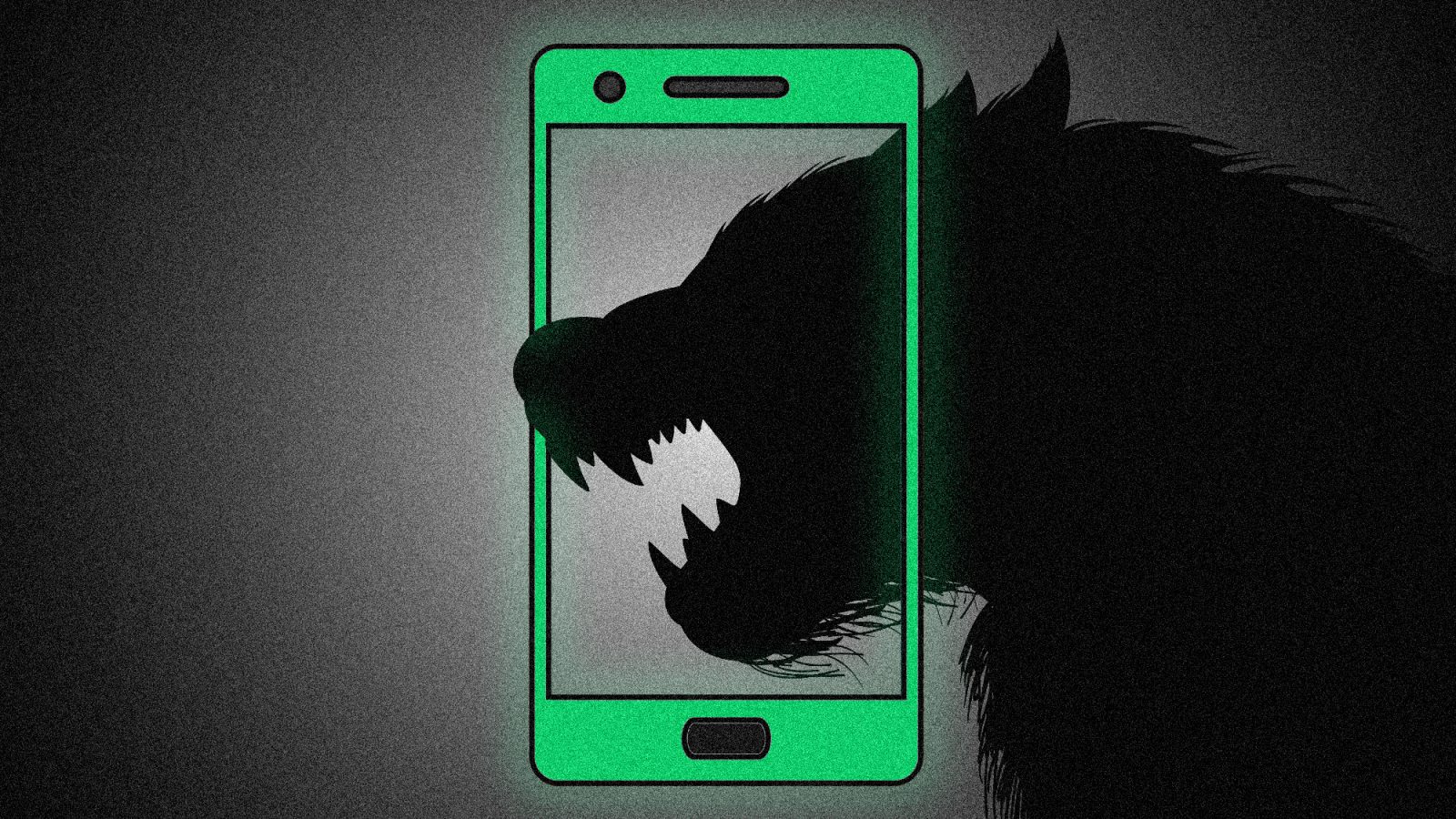{{!completeInfo?'请完善个人信息':''}}
精准高效领先的融资对接服务


Billionaire werewolf love triangles, that is.


· Chinese apps are exporting the country’s vertical streaming industry by making werewolf series in the U.S.
· Streaming app ReelShort ranked as the top-downloaded iOS app in the U.S. for three consecutive days in November.
· The low-budget productions recycle tropes popular in China, like underdog protagonists becoming rich or falling in love with billionaires.
Kasey Esser, an actor and gym owner in Los Angeles, didn’t expect anyone to see his new show. The 34-year-old played a werewolf in Fated to My Forbidden Alpha, released on ReelShort, a little-known Chinese-backed streaming app available in the U.S. and many other countries. Each episode of Esser’s show is a vertical video lasting less than three minutes, filled with cheesy lines and a storyline about a love triangle between billionaire werewolves.
To Esser’s surprise, Fated to My Forbidden Alpha took off. ReelShort advertised clips of the series on TikTok, which have been viewed tens of millions of times, including by some members at Esser’s gym. He’s received fan messages from India, Brazil, Thailand, and Mexico. A fan sent him a T-shirt printed with his photo. “I was totally, totally taken aback,” Esser told Rest of World.
The idea of a smartphone-friendly streaming service, with vertical videos and short episodes, was popularized by Quibi. Founded by Hollywood legend Jeffrey Katzenberg — with a diverse slate of big-name backers including The Walt Disney Company, Goldman Sachs, and BBC Studios — Quibi’s high-profile launch in 2020 was swiftly followed by its much-publicized demise just six months later. But ReelShort isn’t trying to copy Quibi; with cheap production costs and cliched stories, it’s taking inspiration from a model that’s proved successful in China. And it might be working: ReelShort was the top-downloaded iOS entertainment app in the U.S. for three consecutive days in November, according to app research firm Sensor Tower.
 The short, vertical series of a love triangle between werewolves was originally uploaded to the Chinese-backed streaming app ReelShort.
The short, vertical series of a love triangle between werewolves was originally uploaded to the Chinese-backed streaming app ReelShort.
Ultrashort, vertical streaming shows have become a billion-dollar industry in China in the last few years, appealing to smartphone users who prefer shorter videos to full-length soap operas. The plots move quickly and every episode ends in a cliffhanger, pushing users to pay for the next episode to find out what happens next. Some of the most popular shows in this format in China are raking in millions of dollars in subscription revenue.
ReelShort and other Chinese apps like DramaBox, 99TV, and GoodShort are exporting that model abroad. While Quibi spent millions on producing star-studded, Emmy-nominated programs, these companies focus on keeping costs low with little-known actors, rudimentary special effects, and scripts heavy on recycled tropes, like underdog protagonists becoming rich or falling in love with billionaires.
After coming across Esser’s werewolf series on TikTok in July, Sennie Ana downloaded three different streaming apps and watched about 10 other shows, each costing $20–$30. “Nothing in traditional media is cheesy anymore. Everyone takes themselves too seriously,” Ana, a 28-year-old who works at a call center in Washington, D.C., told Rest of World. “I think these [shows] being like, ‘We know we’re goofy’ makes it more relatable for people.”
Instead of competing with Netflix, the shows target a mass market with faster-moving, more emotionally intense plots, Liu Wuhua, founder of Sailing Global, a firm that helps Chinese companies expand overseas, told Rest of World. “The business model has been proven to work at home,” he said.
“You can’t take the stories too seriously; they come from an assembly line.”
Chinese companies are making increasingly higher investments in producing these shows in the U.S. Chen Ruiqing, chairman of DramaBox’s parent company, Dianzhong Technology, told Rest of World they had produced around 10 series over the past year, targeting female viewers in English-speaking countries. He said the company was looking to make 10 series every month in 2024.
The series meet a demand for bite-sized shows in the era of TikTok, according to Chen. The shows on Quibi, seven to 10 minutes in duration, were too long and too expensive to make. “Not everyone goes to the cinema, and not everyone watches HBO or Netflix. [These shows] are movies in the form of short videos,” he said.
Two filmmakers in LA, both of whom have worked on multiple shows for Chinese streaming apps, told Rest of World the platforms mostly recruited Chinese recent graduates from the city’s film schools, who had struggled to find other gigs due to the Hollywood strikes. Some crew members refused to be credited because they didn’t think highly of the shows, the filmmakers said, requesting anonymity out of concern for their future employment.
With a tight budget of around $200,000, each series takes about a week of filming, more than double the speed of most other productions, said one of the filmmakers. The companies mostly cast white actors in lead roles, believing that they connect better with the majority of American viewers, according to the other filmmaker. “You can’t take the stories too seriously,” the person said. “They come from an assembly line.”
Appealing to viewers outside of China isn’t just a new avenue for growth — it comes as the services face increasing government scrutiny back home. During a three-month crackdown starting November 2022, Chinese regulators took down more than 25,300 vertical streaming shows deemed too sexual, vulgar, violent, or of “low taste.” In November, WeChat and TikTok’s sister app Douyin pledged to crack down on stories that promote “money worship” or “unethical relationships.”
It remains unclear whether the apps can sustain their growth or turn a profit abroad. By the end of November, after topping the iOS entertainment charts in the U.S., ReelShort had slid down to 15th place. Crazy Maple Studio — the California-based subsidiary of ReelShort’s owner, Chinese web-literature company COL Group — did not respond to a request for comment. DramaBox has recorded a few million users since its launch in April 2023, with most of the revenue coming from the U.S., Chen said. He declined to comment on its profitability.
“To me, now, the metric for success is how many people see it. The story, sure, people can say whatever.”
Some U.S. viewers told Rest of World they were growing tired of the derivative stories. Kelsey Hamilton, a 29-year-old officer manager in Maryland, said that while she was at first amused by Fated to My Forbidden Alpha, the editing glitches and lack of character development put her off. “Once the initial reaction of it being hilariously bad fizzled out, I’m kind of over it, and I’d rather watch something that’s good,” she said.
For Esser, who moved to LA from Indiana to pursue his Hollywood dream, the unexpected werewolf boom emerged at just the right time. Following the success of his role as “Alpha Alexander,” Esser acted in three more shows. During his most recent shoot in November, for the app 99TV, he again played a caring, heroic alpha werewolf who protects his innocent mate from a villainous alpha. A sweet, virgin werewolf couple spending their first night together has become a recurring scene, Esser said.
His next role is that of another alpha werewolf in love with a poor mate. “To me, now, the metric for success is how many people see it,” Esser said. “The story, sure, people can say whatever. But ultimately, it’s entertaining. It’s really entertaining.”
原文链接:点击前往 >
文章作者:VIOLA ZHOU
版权申明:文章来源于rest of world。该文观点仅代表作者本人,扬帆出海平台仅提供信息存储空间服务,不代表扬帆出海官方立场。因本文所引起的纠纷和损失扬帆出海均不承担侵权行为的连带责任,如若转载请联系原文作者。 更多资讯关注扬帆出海官网:https://www.yfchuhai.com/

{{likeNum}}
好文章,需要你的鼓励
相关阅读
-
 阿布扎比:沙特和迪拜给不了的“富人天堂”
阿布扎比:沙特和迪拜给不了的“富人天堂” -
 义乌起家!这家跨境大卖如今年销10亿
义乌起家!这家跨境大卖如今年销10亿 -
 销售额超10亿美金,家居大卖如何做好海外市场?
销售额超10亿美金,家居大卖如何做好海外市场? -
 中国互联网巨头的中东战事
中国互联网巨头的中东战事 -
 销量增长背后的秘密:HOTWAV如何借力Allegro实现从0到100w的突破?
销量增长背后的秘密:HOTWAV如何借力Allegro实现从0到100w的突破? -
 AC Ventures 与 Bain 公司发布有关印度尼西亚风险投资的综合报告
AC Ventures 与 Bain 公司发布有关印度尼西亚风险投资的综合报告 -
 为什么印度和中国可以为印度尼西亚展示实现净零目标的路径
为什么印度和中国可以为印度尼西亚展示实现净零目标的路径 -
 Naturehike's campaign in the billion-dollar outdoor market and two growth opportunities for established brands going global.
Naturehike's campaign in the billion-dollar outdoor market and two growth opportunities for established brands going global.
 已关注
已关注
 关注
关注

微信号:yfch24



微信号:yfch24
小程序


公众号

社群







